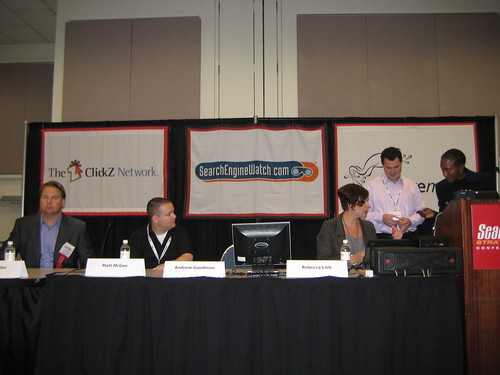Moderator: Rebecca Lieb, Editor-in-Chief, The ClickZ Network
Lee Odden, CEO, TopRank Online Marketing
Lee starts off saying, "in the spirit of the session, we thought we have some of the people in the audience to come up and give the presentation for us." I enjoyed that joke.
1) Users spend a lot of time in UGC (user generated content) 2) Consumers expect to be able to make their own content 3) Consumers trust user generated content 4) Product reviews increase sales 5) Increases conversions 6) It is a great way to generate SEO generated content
UGC is various kinds of media content that are produced by end users.
He then showed examples of sites using UGC.
Types of UGC: - Information Resources -- Wikipedia -- Linked In -- Yahoo Answers -- Etc.
Platforms: - Reviews - Blogs - Etc...
Pros: - UGC is trusted - Contributors are loyal - More content for search engines - More information sources for users
Cons: - Oversight and moderation - Spam - False and outdated info - Who owns the content - Structure can be challenging - Negative information about your brand
Tips on Optimizing UGC: - Crawlable URLs - No session IDs - Less than 3 parameters - Links crawlable - Site Architecture -- Pre define keyword rich categories, topics and tags -- Logical structure and cross linking, bread crumb navigation - Template optimization -- Focus dynamic content as the majority of the on page text -- Dynamic insert title tags, meta descriptions, image al text and anchor text
- Create incentives for content creation -- Contests -- Add functionalities to make it easy
- Crowdsourcing, create a task community with generating ideas, content for a particular goal/purpose - Reward super users with more access and benefits, status
Matt McGee, SEO Manager, Marchex
Case for User Reviews:
- Good For Marketing -- Users add content, often using key search terms -- You gain unique content on boilerplate product pages or... -- Create new pages targeting "review" searches for that product -- May capture more "long tail" queries
- Good For Business -- Reviews educate customers -- Fewer product returns -- Reviews educate the retailers also -- Reviews lead to more sales
Overcoming Fear of Users
- Fear of Negative Reviews -- 85% of reviews are positive on Yelp -- According to Bazaarvoice says 80% of all reviews are either four or five stars -- Negative reviews can be helpful -- Negative reviews create trust -- Reality, no product/service is perfect for everyone
- What if they are not my customer -- Fake reviews --- Not a huge issue --- Track IPs of reviewers --- Require registered accounts, manual processing of submitting reviews via email and "was this review helpful" feature
Implementing Reviews - Add policy - Make sure reviews can be crawlable - Allow shoppers to sort products by rating - Create a top rated products category - Promote the UGC part
Where to get reviews: - Do it yourself - Bazaarvoice - PowerReviews - Amazon - Inods - Expotv
Andrew Goodman, Principal, Page Zero Media
To give case study on his site named HomeStudy
- UGC 1.0 + $$$ + Crowdsourcing savvy = UGC 2.0
First examples: - Open Directory Project -- Army of editors -- Supposedly overcomes the scalability issue -- Directories then fell out of favor -- Issues with quality control
- TripAdvisor -- Users help each other to avoid bad travel experiences, find good ones, etc.
Lessons learned - You can make money from this so now everyone is doing it -- YouTube -- etc.
Unique Advantages of UGC - Search Engine Strategy -- It dovetails with search -- Doesnt compete with search engines - Search Engine Tactics -- Smart tacticians will architect site properly -- Content is popular, topical - Solves long tail weaknesses of editorial driven media - Fills a human need for community and content
UGC Checklist - Got search engine strategy -- Is it risky (he says like Squidoo) - Using Search Tactics -- Architecture -- On-page and off page - Do you compete with Google (i.e. Mahalo) - Do users have any incentive to contribute en masses - Any major drawbacks that will sink you? -- Legal -- User interest is fleeting -- Credibility and truthfulness -- Space just too competitive - Can you become a destination or platform, so 1,2,3 no longer matter
He said TripAdvisor had all of this in place, so they did well
PlentyOfFish.com is a great example, turned a dating site into an open network. It grew like wild fire.
Yelp had good search engine strategies, the incentives were offline promotions,
NowPublic.com doesnt have a search strategy
Squidoo's top 100 is pretty much all about handbags, seems like that screen shot was spammed.
Mahalo's problem is that they do have crowdsouricng but they compete with Google. They cant win unless they become a destination.
HomeStars "the zillow for after you own the home" - Search strategy like Yelp - Sheer user interest
Questions: - How dependent is your site on user generated content?


